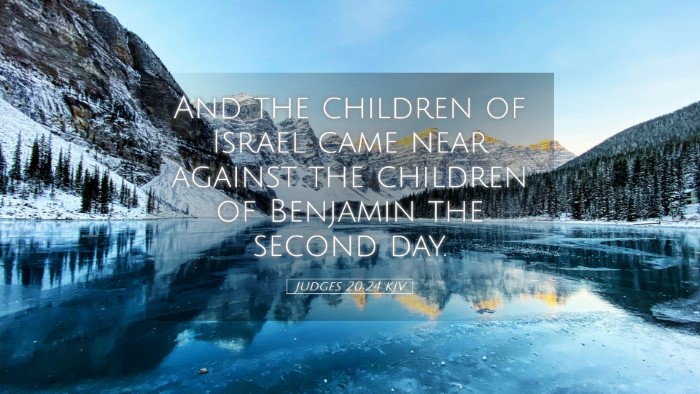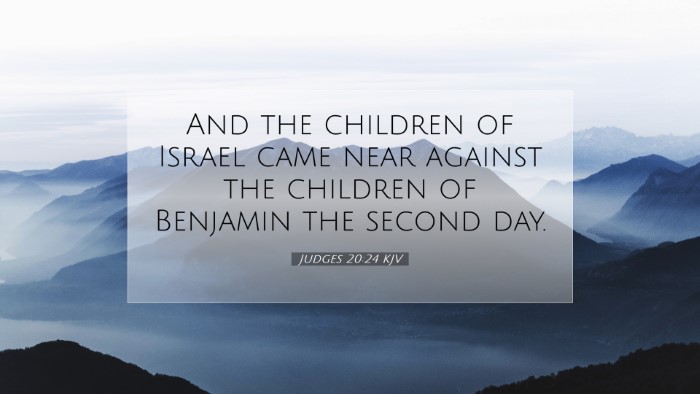Commentary on Judges 20:24
Verse Reference: Judges 20:24 - "And the children of Israel came near against the children of Benjamin the second day."
Introduction
The Book of Judges chronicles a tumultuous period in Israel's history, showcasing cycles of sin, oppression, repentance, and deliverance. Judges 20 depicts the devastating conflict between the tribe of Benjamin and the other tribes of Israel, following the horrific incident at Gibeah. In this verse, the focus is on the continuation of that battle, revealing the depths of the Israelites' resolve and the complexities of their collective response to sin.
Contextual Background
Before delving into the specifics of Judges 20:24, it is crucial to understand the backdrop of this conflict. The events leading up to this moment are steeped in moral decline, where the Levite's concubine was abused and murdered in Gibeah, leading to Israel's call to arms against the tribe of Benjamin. The assurance of God's presence was sought through casting lots, leading to the emergence of an inter-tribal war.
Insights from Matthew Henry
Matthew Henry's commentary offers profound insights into the moral implications of this passage. He notes that the continued aggression of Israel against Benjamin signifies not only a reaction to the atrocity committed but also a collective responsibility for sin. Henry emphasizes the theme of unity among the tribes of Israel, even in their aggression. He writes:
"They were united in their resolve against a common enemy, yet their unity was born out of the sin that had affected them all."
Henry articulates that this verse highlights the seriousness with which the Israelites approached their moral and social obligations. The notion that they came "near" on the second day illustrates a determination to address iniquity and a willingness to confront sin directly, even when it meant resorting to civil war.
Insights from Albert Barnes
Albert Barnes provides a more analytical perspective on Judges 20:24. He points out that the expression "came near" indicates readiness and preparedness for battle, symbolizing Israel's resolve to eradicate the evil present among their brethren. Barnes states:
"This endeavor to root out wickedness, although ruthless, illustrates the concept of communal justice that prevailed among the Israelites."
He further explains the historical context, situating Israel's actions within the framework of divine justice. Barnes reminds us that God's justice often manifests through human actions, especially in times of great social decay. The tribe of Benjamin's defense or lack of repentance can be viewed as a critical point in understanding the broader narrative—not just of retribution, but of the struggle for holiness among God's people.
Insights from Adam Clarke
Adam Clarke brings additional depth to our understanding of this passage by highlighting the spiritual ramifications of the conflict. He posits that the war was not merely a physical confrontation but a spiritual battle as well. Clarke writes:
"The second day of battle reflects the persistence of sin and the unwillingness of the tribes to allow evil to thrive unchallenged."
Clarke’s commentary also covers the intense emotions involved in this scenario, suggesting that the desire for vengeance overshadowed the hope for reconciliation. He warns scholars and theologians about how unresolved sin can lead to escalation without genuine reflection or repentance within a community.
Theological Significance
This verse serves as a poignant reflection on several theological themes:
- Judgment and Mercy: The tension between God’s justice and the mercy He extends even amidst communal sin.
- Unity versus Division: The paradox of how shared sin can lead to both unity against a common foe and division amongst the tribes.
- The Role of Leadership: Highlighting the responsibilities of leaders in guiding their people towards accountability and understanding the weight of corporate sin.
Application for Today
For pastors and theologians, Judges 20:24 serves as a foundation for discussing the implications of communal sin and the responsibility of believers in addressing wrongdoing within the church. It challenges congregations to pursue holiness and to hold one another accountable. Furthermore, it presents a call to action for the church to reflect the unity and righteousness of God’s kingdom, even when facing difficult issues.
Conclusion
Judges 20:24, set against its harrowing historical context, poses challenging questions for contemporary believers. The determination of the Israelites reflects not only a desperate desire for justice but also highlights the complexities of human nature in confronting sin. Through the insights of Matthew Henry, Albert Barnes, and Adam Clarke, we see a multifaceted understanding of this verse that encourages deep reflection on justice, mercy, and accountability within our communities today.


